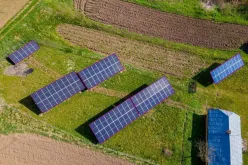Six hundred million people living in Africa lack access to energy. Expanding the sustainable energy offer requires effective planning and coordination, as well as many layers of data. The UN Development Programme (UNDP) is working with partners and Online Volunteers to address the data gap in solar mini-grid installations across the continent.
One of the foundational data layers needed for the development of efficient approaches to solar energy expansion is information on solar mini-grid installations. These offer a sustainable and affordable solution to expand energy access, particularly in remote areas with high sun exposure.
Currently, this information is scattered and incomplete, with no algorithm to tackle this problem and no existing data sets that could be used to develop one. To counter this challenge, UNDP collaborated with a private sector company, Datatonic, to explore whether this data gap can be filled with a machine-learning model to detect existing solar mini-grids on satellite imagery.
Nine Online Volunteers served with UNDP on solar panel labeling tasks in Africa. From nine different countries and with diverse backgrounds, the volunteers received training on how to use CVAT, an open-source machine learning software tool for image and video annotations.
Each volunteer was tasked with creating labels for solar cells and solar water heaters identified on satellite imagery. These labels were then evaluated by the team for quality control before being put to use in the development of the machine learning algorithm to detect mini-grid installations.
Daniel Dzanga (Kenya) was among the Online Volunteers, each of whom devoted some 20 hours per week for a total duration of two weeks on this assignment. He has a background in geospatial engineering and data analytics.
I am a firm believer in sustainable solutions and this energy project seemed in line with that vision. Along with identifying solar panels, I also reviewed annotated images for accuracy. My volunteer contribution assisted in the data collection stage of the project. Through volunteering, I added to my network but also gave back to a shared vision of sustainability. --Daniel Dzanga, Online Volunteer
The machine learning model is currently being analyzed to improve its performance and outcome accuracy. All assets obtained during this process, including labeled data, evaluation site and the developed model are open-sourced, for others to continue building on.
For UNDP, the collaboration was effective and yielded the desired results.
The contributions of the Online Volunteers facilitated a quicker, more efficient and time-saving labelling exercise to build a reliable inventory of existing solar installations. Their involvement brought new perspectives and innovative ideas, adding to the success of the project. And the teamwork was most captivating. --Freshia Wairimu, Digital Transformation Associate at UNDP
The Africa Mini-grids Programme (AMP) is UNDP's most ambitious energy access programme to date. It aims to improve financial viability and promote scaled-up commercial investment in solar battery mini-grids in Africa. For more information on this project, please contact Valeriya Zaytseva (valeriya.zaytseva@undp.org).
Datatonic is a team of data experts that enables businesses to perform better through the power of analytics.

